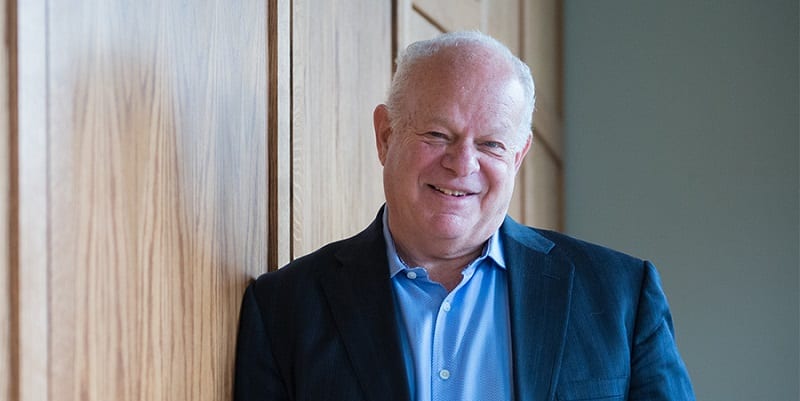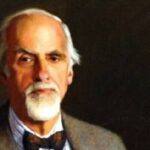Martin Seligman biography and books

Martin Seligman (Martin Elias Seligman, born Aug. 12, 1942) is an American psychologist, author and specialist in parenting. Martin Seligman has authored several self-help books and is a strong supporter and promoter of positive psychology. His theory of learned helplessness is popular among clinical and scientific psychologists.
Seligman is the Zellerbach Family Professor of Psychology at the University of Pennsylvania. He previously was the director of the clinical training program at the same university and a lecturer at Cornell University. Here, he still is the director of the Positive Psychology Center. He was elected president of the American Psychological Association (APA) in 1998 and is the founder of Prevention and Treatment, an online magazine. He also serves on the board of advisors of Parents magazine.
The biography of Martin Seligman
Martin Seligman was born in Albany, upstate New York, to a Jewish family. He attended public elementary school and later enrolled at The Albany Academy. He earned a bachelor’s degree from Princeton University in 1964. He graduated summa cum laude. In his senior year, Martin had to choose between several programs at the University of Pennsylvania and the University of Oxford. He chose the University of Pennsylvania to study psychology. In 1967, he earned his Ph.D.
The Learned helplessness theory
The first outlines of his theory of learned helplessness emerged during his initial research at the University of Pennsylvania. It initially began as an extension of his interest in depression.
By chance, Martin Seligman and his colleagues discovered that the experimental conditioning protocol they used with dogs, led to unexpected behavior. Under the experimental conditions, dogs did not respond to opportunities to escape from an unpleasant situation. In doing so, Seligman discovered the phenomenon of learned helplessness: a psychological state in which a human or animal has learned to act helplessly in certain situations.
In this, Martin Seligman saw a resemblance to severely depressed patients. He argued that clinical depression and other disorders result in part from a perceived lack of control over the outcome of a situation.
Positive psychology
Seligman worked with Christopher Peterson, among others. Together they developed what they themselves describe as a counterpart to the Diagnostic and Statistical Manual of Mental Disorders (DSM). DSM focuses on what can go wrong. Their creation, Character Strenghts and Virtues, focused on what can go right.
Together, they examined different cultures and millennia to try to compile a manageable list of virtues amen that were valued, from ancient China to India to contemporary Western cultures.
This list includes six character strengths:
- Wisdom/knowledge
- Courage
- Humanity
- Justice
- Moderation
- Transcendence
Each of these items includes three to five sub-items. For example, moderation includes:
- Forgiveness
- Humility
- Prudence
- Self-regulation
Contributions to psychology
Seligman was influenced by humanistic thinkers such as Carl Rogers and Abraham Maslow. Positive psychology continued to grow strongly after Seligman laid its foundations. For this reason, he has been called the father of positive psychology.
He wrote several books, including the bestseller Authentic Happiness. He also developed the PERMA model.
The acronym PERMA stands for:
- Positive emotion
- Engagement
- Relationships
- Meaning
- Achievement
Famous quotes
- “Well-being cannot exist just in your own head. Well-being is a combination of feeling good as well as actually having meaning, good relationships and accomplishment.”
- “The good life consists in deriving happiness by using your signature strengths every day in the main realms of living. The meaningful life adds one more component: using these same strengths to forward knowledge, power or goodness.”
- “Positive thinking is the notion that if you think good thoughts, things will work out well. Optimism is the feeling of thinking things will be well and be hopeful.”
- “It is the combination of reasonable talent and the ability to keep going in the face of defeat that leads to success.”
- “I think you can be depressed and flourish, I think you can have cancer and flourish, I think you can be divorced and flourish. When we believed that happiness was only smiling and good mood, that wasn’t very good for people like me, people in the lower half of positive affectivity.”
- “Reaching beyond where you are is really important.”
- “What humans want is not just happiness. They want justice; they want meaning.”
- “The belief that we can rely on shortcuts to happiness, joy, rapture, comfort, and ecstasy, rather than be entitled to these feelings by the exercise of personal strengths and virtues, leads to legions of people who, in the middle of great wealth, are starving spiritually.”
- “On the relationship side, if you teach people to respond actively and constructively when someone they care about has a victory, it increases love and friendship and decreases the probability of depression.”
- “The best therapists can do with sadness, anger, and anxiety is to help patients live in the more comfortable part of their set range.”
- “Positive psychology is not remotely intended to replace therapy or pharmacology. So when depressed, anxious or in panic or post-traumatic stress disorder, I am all for therapies that will work. Positive psychology is another arrow in the quiver of public policy and psychology through which we can raise wellbeing above zero.”
- “If we just wanted positive emotions, our species would have died out a long time ago.”
- “When we take time to notice the things that go right – it means we’re getting a lot of little rewards throughout the day.”
- “I don’t mind being wrong, and I don’t mind changing my mind.”
- “In human history, we are going from knowledge to omniscience, from potence to omnipotence, from ethics and religion to righteousness. So, in my view, God comes at the end of this long process. This may not happen in our lifetimes or even in the lifetime of our species.”
- “There are physical characteristics which are inherited. These include things like good looks, high intelligence, physical coordination. These attributes contribute to success in life, and success in life is a determinant of optimism.”
- “Suppose you could be hooked up to a hypothetical ‘experience machine’ that, for the rest of your life, would stimulate your brain and give you any positive feelings you desire. Most people to whom I offer this imaginary choice refuse the machine. It is not just positive feelings we want: we want to be entitled to our positive feelings.”
- “You can have meaning, accomplishment, engagement and good relationships, even if you are dull on the positive affect side.”
- “The dirty little secret of both clinical psychology and biological psychiatry is that they have completely given up on the notion of cure.”
- “I believe it is within our capacity that by the year 2051 that 51 percent of the human population will be flourishing. That is my charge.”
- “I believe psychology has done very well in working out how to understand and treat disease. But I think that is literally half-baked. If all you do is work to fix problems, to alleviate suffering, then by definition you are working to get people to zero, to neutral.”
- “Positive emotion alienated from the exercise of character leads to emptiness, to inauthenticity, to depression, and, as we age, to the gnawing realization that we are fidgeting until we die.”
- “Creativity is bound up in our ability to find new ways around old problems.”
- “The word ‘happiness’ always bothered me, partly because it was scientifically unwieldy and meant a lot of different things to different people, and also because it’s subjective.”
- “I believe psychology has done very well in working out how to understand and treat disease. But I think that is literally half-baked. If all you do is work to fix problems, to alleviate suffering, then by definition you are working to get people to zero, to neutral.”
- “Positive emotion alienated from the exercise of character leads to emptiness, to inauthenticity, to depression, and, as we age, to the gnawing realization that we are fidgeting until we die.”
- “P is positive emotion, E is engagement, R is relationships, M is meaning and A is accomplishment. Those are the five elements of what free people chose to do. Pretty much everything else is in service of one of or more of these goals. That’s the human dashboard.”
- “I think we pursue positive relationships whether or not they bring us engagement or happiness.”
- “We have children to pursue other elements of well-being. We want meaning in life. We want relationships.”
- “One of my signature strengths is the love of learning, and by teaching, I have built it into the fabric of my life. I try to do some of it every day.”
- “One of the things psychologists used to say was that if you are depressed, anxious or angry, you couldn’t be happy. Those were at opposite ends of a continuum. I believe that you can be suffering or have a mental illness and be happy – just not in the same moment that you’re sad.”
- “Life satisfaction essentially measures cheerful moods, so it is not entitled to a central place in any theory that aims to be more than a happiology.”
- “One of my worries about America is the epidemic of depression we’ve been in. One of the possibilities about that is that the ‘I’ gets bigger and bigger, and the ‘we’ gets smaller and smaller.”
- “I’m trying to broaden the scope of positive psychology well beyond the smiley face. Happiness is just one-fifth of what human beings choose to do.”
- “I have never worked on interrogation; I have never seen an interrogation, and I have only a passing knowledge of the literature on interrogation. With that qualification, my opinion is that the point of interrogation is to get at the truth, not to get at what the interrogator wants to hear.”
- “I strongly disapprove of torture and have never and would never provide assistance in its process.”
- “Rather than giving people an inflated view of themselves, we need to give them concrete reasons to feel good about themselves.”
- “If you were an optimistic teen, then you’ll be an optimist at 80. People’s reactions to bad events are highly stable over a half century or more.”
- “It’s my belief that, since the end of the Second World War, psychology has moved too far away from its original roots, which were to make the lives of all people more fulfilling and productive, and too much toward the important, but not all-important, area of curing mental illness.”
- “Perhaps the single most robust fact across many surveys is that married people are happier than anyone else.”
- “Sexual performance problems, such as impotence and frigidity, are 70 to 90 percent changeable. But a homosexual who wants to be a heterosexual – that’s close to unchangeable. And a transsexual – say a man who believes he’s really a woman in a man’s body – is completely unchangeable; you’d have to change the body to conform to the psyche.”
- “I’ve been bothered about time generally and our tripartite division of time into past, present, and future. I think I know what the past is, and I think I know what future is, but I’m really not comfortable with the notion of present.”
Books and Publications by Martin Seligman
- 2018. The optimistic child: A revolutionary approach to raising resilient children. Hachette UK.
- 2018. PERMA and the building blocks of well-being. The journal of positive psychology, 13(4), 333-335.
- 2013. Explanatory style. Routledge.
- 2013. Personality, gender, and age in the language of social media: The open-vocabulary approach. PloS one, 8(9), e73791.
- 2012. Flourish: A visionary new understanding of happiness and well-being. Simon and Schuster.
- 2011. Doing the right thing: Measuring wellbeing for public policy. International journal of wellbeing, 1(1).
- 2009. Positive education: Positive psychology and classroom interventions. Oxford review of education, 35(3), 293-311.
- 2008. Positive health. Applied psychology, 57, 3-18.
- 2007. Strengths of character, orientations to happiness, and life satisfaction. The journal of positive psychology, 2(3), 149-156.
- 2006. Learned optimism: How to change your mind and your life. Vintage.
- 2006. Self-discipline gives girls the edge: Gender in self-discipline, grades, and achievement test scores. Journal of educational psychology, 98(1), 198.
- 2006. Positive psychotherapy. American psychologist, 61(8), 774.
- 2005. Self-discipline outdoes IQ in predicting academic performance of adolescents. Psychological science, 16(12), 939-944.
- 2005. Positive psychology progress: empirical validation of interventions. American psychologist, 60(5), 410.
- 2005. Positive psychology in clinical practice. Annu. Rev. Clin. Psychol., 1, 629-651.
- 2005. Orientations to happiness and life satisfaction: The full life versus the empty life. Journal of happiness studies, 6, 25-41.
- 2004. Character strengths and virtues: A handbook and classification (Vol. 1). Oxford University Press.
- 2004. Strengths of character and well-being. Journal of social and Clinical Psychology, 23(5), 603-619.
- 2004. Beyond money: Toward an economy of well-being. Psychological science in the public interest, 5(1), 1-31.
- 2002. Authentic happiness: Using the new positive psychology to realize your potential for lasting fulfillment. Simon and Schuster.
- 2002. Very happy people. Psychological science, 13(1), 81-84.
- 2002. Positive psychology, positive prevention, and positive therapy. Handbook of positive psychology, 2(2002), 3-12.
- 2000. Positive psychology: An introduction (Vol. 55, No. 1, p. 5). American Psychological Association.
- 1998. Building human strength: Psychology’s forgotten mission.
- 1995. The effectiveness of psychotherapy: The Consumer Reports study. American psychologist, 50(12), 965.
- 1992. Predictors and consequences of childhood depressive symptoms: a 5-year longitudinal study. Journal of abnormal psychology, 101(3), 405.
- 1988. Pessimistic explanatory style is a risk factor for physical illness: a thirty-five-year longitudinal study. Journal of personality and social psychology, 55(1), 23.
- 1986. Learned helplessness in children: a longitudinal study of depression, achievement, and explanatory style. Journal of personality and social psychology, 51(2), 435.
- 1986. Explanatory style as a predictor of productivity and quitting among life insurance sales agents. Journal of personality and social psychology, 50(4), 832.
- 1984. Causal explanations as a risk factor for depression: theory and evidence. Psychological review, 91(3), 347.
- 1982. The attributional style questionnaire. Cognitive therapy and research, 6(3), 287-299.
- 1979. Depressive attributional style. Journal of abnormal psychology, 88(3), 242.
- 1978. Learned helplessness in humans: critique and reformulation. Journal of abnormal psychology, 87(1), 49.
- 1976. Learned helplessness: theory and evidence. Journal of experimental psychology: general, 105(1), 3.
- 1975. Generality of learned helplessness in man. Journal of personality and social psychology, 31(2), 311.
- 1975. Depression and learned helplessness in man. Journal of abnormal psychology, 84(3), 228.
- 1974. Depression and learned helplessness. John Wiley & Sons.
- 1972. Learned helplessness. Annual review of medicine, 23(1), 407-412.
- 1971. Phobias and preparedness. Behavior therapy, 2(3), 307-320.
- 1970. On the generality of the laws of learning. Psychological review, 77(5), 406.
- 1967. Failure to escape traumatic shock. Journal of experimental psychology, 74(1), 1.
- 1967. Effects of inescapable shock upon subsequent escape and avoidance responding. Journal of comparative and physiological psychology, 63(1), 28.
How to cite this article:
Janse, B. (2023). Martin Seligman. Retrieved [insert date] from Toolshero: https://www.toolshero.com/toolsheroes/martin-seligman/
Original publication date: 03/07/2023 | Last update: 07/27/2023
Add a link to this page on your website:
<a href=”https://www.toolshero.com/toolsheroes/martin-seligman/”>Toolshero: Martin Seligman</a>











